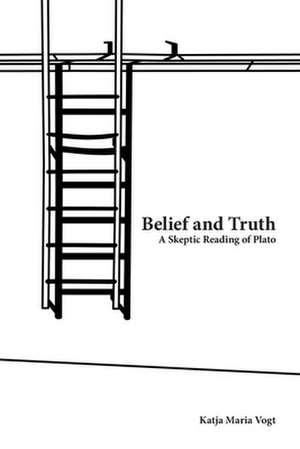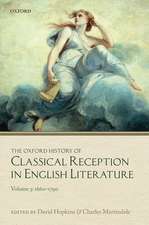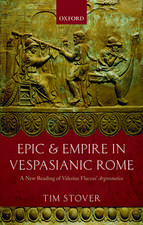Belief and Truth: A Skeptic Reading of Plato
Autor Katja Maria Vogten Limba Engleză Paperback – 20 aug 2015
| Toate formatele și edițiile | Preț | Express |
|---|---|---|
| Paperback (1) | 289.65 lei 31-37 zile | |
| Oxford University Press – 20 aug 2015 | 289.65 lei 31-37 zile | |
| Hardback (1) | 496.74 lei 31-37 zile | |
| Oxford University Press – 20 sep 2012 | 496.74 lei 31-37 zile |
Preț: 289.65 lei
Nou
Puncte Express: 434
Preț estimativ în valută:
55.43€ • 57.26$ • 46.13£
55.43€ • 57.26$ • 46.13£
Carte tipărită la comandă
Livrare economică 14-20 martie
Preluare comenzi: 021 569.72.76
Specificații
ISBN-13: 9780190277192
ISBN-10: 019027719X
Pagini: 224
Dimensiuni: 140 x 210 x 13 mm
Greutate: 0.28 kg
Editura: Oxford University Press
Colecția OUP USA
Locul publicării:New York, United States
ISBN-10: 019027719X
Pagini: 224
Dimensiuni: 140 x 210 x 13 mm
Greutate: 0.28 kg
Editura: Oxford University Press
Colecția OUP USA
Locul publicării:New York, United States
Recenzii
This is a stimulating book on the history of philosophy which systematically defends a single message: beliefs are deficient cognitive attitudes.
No other book on the subject focuses so ably on one issue while demonstrating the extent to which that issue has influenced subsequent history up to the present day. Highly recommended.
This elegantly written book makes a significant contribution to current debates about ancient epistemology, by offering a series of radical new perspectives, both historical and philosophical. It deploys a combination of skills rare among specialists in ancient philosophy. Even at their most speculative, its findings will deserve a serious hearing.
This book presents some of the best and most interesting work in the history of philosophy I have encountered in quite a few years. It should have real impact both on thinking about ancient philosophy and on thinking about the options available in contemporary discussions of knowledge and belief.
This is a very exciting book.... The main ideas, of belief being widely regarded as deficient and of the Stoics and skeptics in this respect standing in the shadow of Plato, are well worth taking on board.
Just as Vogt [seeks] to do philosophy with Plato, her book compels us to do philosophy with her. Moreover, Vogt's challenging book has done the very hard labor of providing a Skeptic account of Plato on belief. Her work provides the much needed epistemic core for a more broadly Skeptic reading of Plato in which one sees the entire corpus as aporetic.
You cannot help but admire the lucidity with which the author addresses issues long debated by scholars.
Vogt's interpretation of Pyrrhonian skepticism and her interpretation of Sextus' understanding of his philosophical predecessors and contemporaries are nuanced and persuasive.
[Vogt's book] is an excellent and provocative study that offers compelling support for the notion that belief is a risky endeavour and for the sceptical inclination to opt for 'investigative attitudes that fall short of truth-claims' (p.190) ... The central intuition at work throughout is that belief is an inherently deficient doxastic state, one that we should strive to replace with the completely different state of knowledge. This is in marked contrast to a widely held contemporary view that knowledge is a species of belief ...
This is a stimulating book on the history of philosophy which systematically defends a single message: beliefs are deficient cognitive attitudes. [...] Vogt's book is to be recommended because it revives a long-standing skeptical tradition from Plato onwards and addresses important systematic questions. As Vogt comments at the beginning of her book, this tradition is not concerned with whether I have hands or with whether you are not a zombie (as other familiar skeptical problems have it), but concerns rather the importance of forming beliefs about such matters in the first place. This tradition, as Vogt emphasizes, can be seen as a battle against one's own ignorance-and this is a message worth telling. This battle does not imply, indeed, that we should make more knowledge claims. It means rather that we should know which knowledge claims we are entitled to make-namely, hardly any.
No other book on the subject focuses so ably on one issue while demonstrating the extent to which that issue has influenced subsequent history up to the present day. Highly recommended.
This elegantly written book makes a significant contribution to current debates about ancient epistemology, by offering a series of radical new perspectives, both historical and philosophical. It deploys a combination of skills rare among specialists in ancient philosophy. Even at their most speculative, its findings will deserve a serious hearing.
This book presents some of the best and most interesting work in the history of philosophy I have encountered in quite a few years. It should have real impact both on thinking about ancient philosophy and on thinking about the options available in contemporary discussions of knowledge and belief.
This is a very exciting book.... The main ideas, of belief being widely regarded as deficient and of the Stoics and skeptics in this respect standing in the shadow of Plato, are well worth taking on board.
Just as Vogt [seeks] to do philosophy with Plato, her book compels us to do philosophy with her. Moreover, Vogt's challenging book has done the very hard labor of providing a Skeptic account of Plato on belief. Her work provides the much needed epistemic core for a more broadly Skeptic reading of Plato in which one sees the entire corpus as aporetic.
You cannot help but admire the lucidity with which the author addresses issues long debated by scholars.
Vogt's interpretation of Pyrrhonian skepticism and her interpretation of Sextus' understanding of his philosophical predecessors and contemporaries are nuanced and persuasive.
[Vogt's book] is an excellent and provocative study that offers compelling support for the notion that belief is a risky endeavour and for the sceptical inclination to opt for 'investigative attitudes that fall short of truth-claims' (p.190) ... The central intuition at work throughout is that belief is an inherently deficient doxastic state, one that we should strive to replace with the completely different state of knowledge. This is in marked contrast to a widely held contemporary view that knowledge is a species of belief ...
This is a stimulating book on the history of philosophy which systematically defends a single message: beliefs are deficient cognitive attitudes. [...] Vogt's book is to be recommended because it revives a long-standing skeptical tradition from Plato onwards and addresses important systematic questions. As Vogt comments at the beginning of her book, this tradition is not concerned with whether I have hands or with whether you are not a zombie (as other familiar skeptical problems have it), but concerns rather the importance of forming beliefs about such matters in the first place. This tradition, as Vogt emphasizes, can be seen as a battle against one's own ignorance-and this is a message worth telling. This battle does not imply, indeed, that we should make more knowledge claims. It means rather that we should know which knowledge claims we are entitled to make-namely, hardly any.
Notă biografică
Katja Maria Vogt is Professor of Philosophy, at Columbia University. She is the author of Law, Reason, and the Cosmic City (OUP, 2007)












